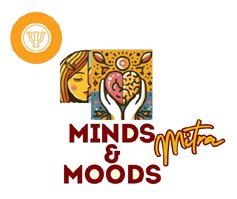A Guiding Light through the Darkness: Depression Therapy
Depression is a serious mood disorder that goes beyond simply feeling sad. It’s a persistent state of low mood and loss of interest that can significantly interfere with daily life. Unlike typical sadness, which is a normal human emotion, depression is a complex condition that can affect your thoughts, feelings, and physical well-being. It can make even the simplest tasks feel insurmountable, and it’s a condition that requires professional support.
Rrimi Bodalkar: A Trusted Guide in Nagpur
Rrimi Bodalkar, a Senior Psychotherapist and Mental Health Counsellor in Nagpur, is dedicated to providing compassionate and effective support for those struggling with mental health. With an M.A. in Psychology (Counselling) and a PGDMH (Clinical), she is a highly skilled practitioner of CBT, REBT, & DBT (Specialised). Her expertise, enhanced by certification in Psychometric Analysis & Learning Style Assessment, allows her to offer comprehensive services for a range of issues, from Negative thinking therapist and Anger management counselling to Relationship counselling and Couple therapy. She is committed to helping her clients, including parents seeking Parenting support counsellor services or individuals dealing with Public speaking anxiety treatment, find a path to healing and renewed purpose.
Symptoms of Depression
Recognizing the symptoms of depression is the first step toward seeking help. While not everyone experiences the same symptoms, common signs include:
- Persistent sadness or an “empty” mood: Often the most prominent symptom.
- Loss of interest or pleasure: Activities once enjoyed no longer bring joy.
- Changes in appetite or weight: Either significant weight loss or gain.
- Sleep disturbances: Insomnia or hypersomnia.
- Fatigue and loss of energy: Constant tiredness despite rest.
- Feelings of worthlessness or guilt: Overly self-critical and feeling like a burden.
- Difficulty concentrating: Impaired ability to think, focus, and decide.
- Recurrent thoughts of death or suicide: Requires immediate attention.
Other related issues like workplace stress counselling or burnout counselling can often be early indicators of a developing depressive state. A Depression therapist or Mental Health Counsellor can help identify and address these issues before they escalate.
Causes of Depression
The causes of depression are multifaceted and can include a combination of genetic, biological, environmental, and psychological factors:
- Genetic predisposition: Family history of depression or anxiety.
- Major life events: Loss of a loved one, relationship breakdown, or career setback (Grief and loss counselling, Life transition counselling).
- Chemical imbalances: Neurotransmitter disruptions involving serotonin and dopamine.
- Chronic stress or trauma: Long-term stress, unresolved trauma therapy, or PTSD.
- Medical conditions: Chronic illness, hormonal imbalances, or neurological issues.
- Teenage triggers: School stress counselling, academic stress psychologist, and social pressure.
Treatment and Procedure
Depression Therapy is highly effective and often involves a combination of talk therapy and, in some cases, medication. The process usually begins with a comprehensive psychological assessment, including Neuropsychological testing or Personality assessment, to evaluate cognitive and emotional functioning.
- Cognitive Behavioral Therapy (CBT): Identifies and challenges negative thought patterns.
- Rational Emotive Behavior Therapy (REBT): Disputes irrational beliefs and replaces them with healthier perspectives.
- Dialectical Behavior Therapy (DBT): Improves emotional regulation and coping skills.
- Behavioral Therapy: Encourages positive, rewarding activities to reduce social withdrawal.
- Personal counselling: Explores root causes and builds resilience.
- Confidence building counsellor: Helps regain self-esteem.
- Trauma therapy / PTSD counselling: Addresses underlying trauma-related depression.
Frequently Asked Questions (FAQs)
Q1: How long does depression therapy take?
A: It depends on the severity and individual response. Some improve in weeks, while others may need longer-term therapy.
Q2: Can I get better without medication?
A: Yes, mild to moderate depression often responds well to therapy alone. Severe cases may benefit from a combination of medication and therapy.
Q3: Is depression counselling confidential?
A: Absolutely. Sessions are private, and counsellors are ethically bound to maintain confidentiality.
Q4: Can a child psychologist help with depression in children?
A: Yes, early intervention is vital. A Child psychologist can address school stress counselling and provide support for special needs children.
Q5: What’s the difference between a Psychologist and a Psychotherapist?
A: Psychologists usually have doctoral training and diagnose conditions, while psychotherapists provide therapy, including Mental Health Counsellors.
Q6: Can relationship counselling help with depression?
A: Yes. Depression affects relationships. Couple therapy or Marriage counselling can help partners manage challenges together.

